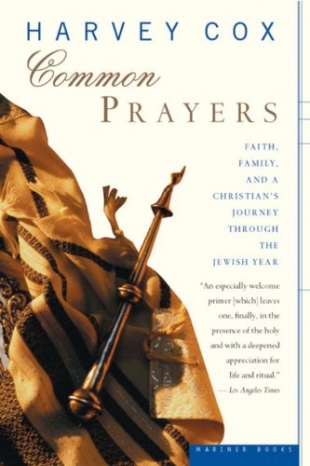It is such an honor and a treat to have Harvey Cox, Thomas Professor of Divinity at Harvard University, once again lead us on an interfaith expedition. In Fire from Heaven, he brilliantly taught us about the phenomenal growth and meaning of Pentecostalism. Here Cox is much more personal, sharing stories and experiences as a Christian on what it is like to be married to a committed Jew and raising a Jewish son. Although others have taken a crack at explaining interfaith marriages, this sophisticated, sensitive, and in-depth work stands head-and-shoulders above the rest.
As usual, Cox's ambitions are sky-high: (1) to help Christians achieve a more realistic and substantive understanding of Judaism, (2) to explain how his Christianity has been enriched by marriage to a Jewish woman who has encouraged his participation in her faith community, (3) "to question the idea that a Jewish-Christian marriage necessarily dilutes the substance of either or both spouses' faiths," and (4) to give Jewish leaders a fresh perspective on a Christian's experience of their religion. At one point, the author notes that Judaism emphasizes distinctions. Cox's ability to do the same gives this spiritual adventure story a sturdy foundation and a rich lode of multiple meanings.
The modus operandi of Common Prayers is a journey through the Jewish year with side trips to a bar mitzvah, a marriage, several funerals, and a few trips to Israel. Again and again Cox evidences a deep reverence for Jewish holidays and their varied rituals. He writes cogently about the Abraham and Isaac story, the medieval ritual of casting away one's sins by a lake or a river, the Jewish concepts of collective repentance and seeking the forgiveness of those we have mistreated, and the antic significances of Purim.
At the start of this case study of one interfaith marriage, the author notes: "Throughout the ancient world, many gentiles worshiped with Jews without ever converting to Judaism. The Jews welcomed them as 'God-fearers,' and their presence in the Temple reflected the age-old Jewish hope that one day all nations and peoples, including 'strangers and sojourners,' would join in praise of the One who created them all." Cox's report from the Court of the Gentiles is salutary — a spiritual wake-up call for Christian communities who still persist in displacement theology or missions to the Jews. This entire book models the spiritual practice of hospitality in imaginative ways. Cox concludes wisely: "The much touted Jewish-Christian dialogue cannot continue as a duet. It must become a trio, a quartet, and eventually a whole choir."
